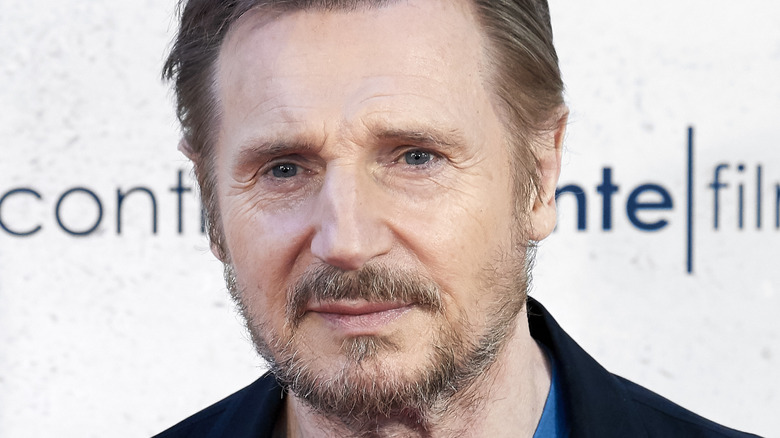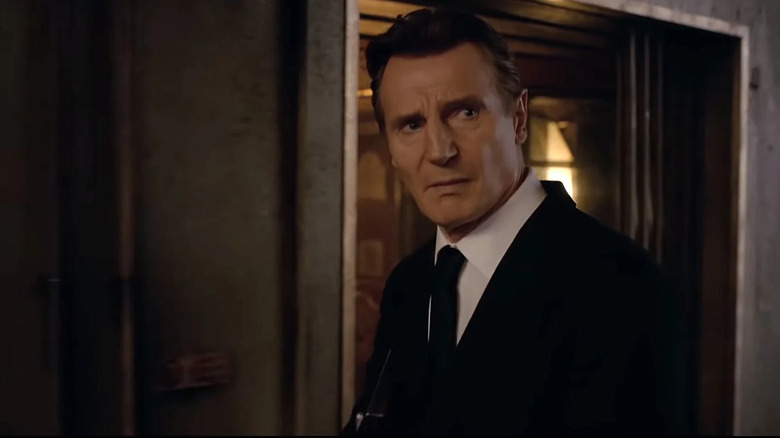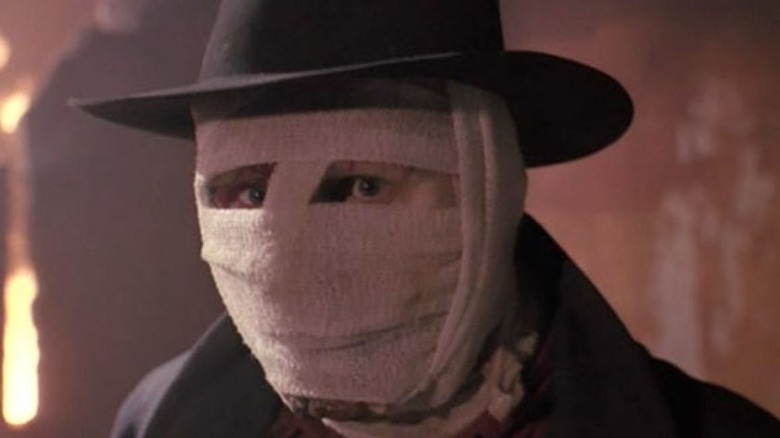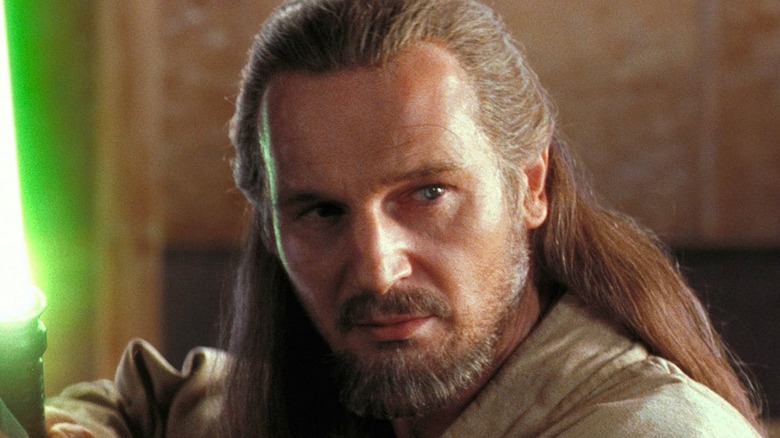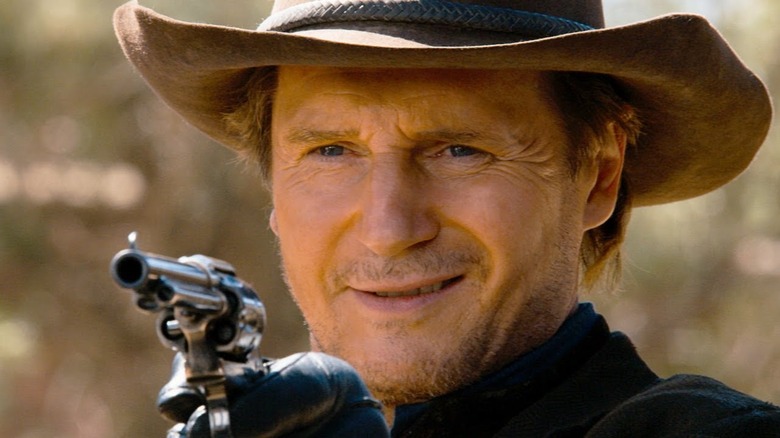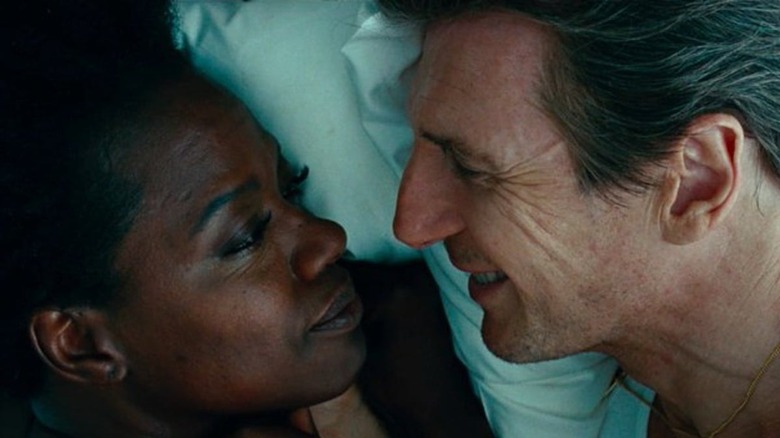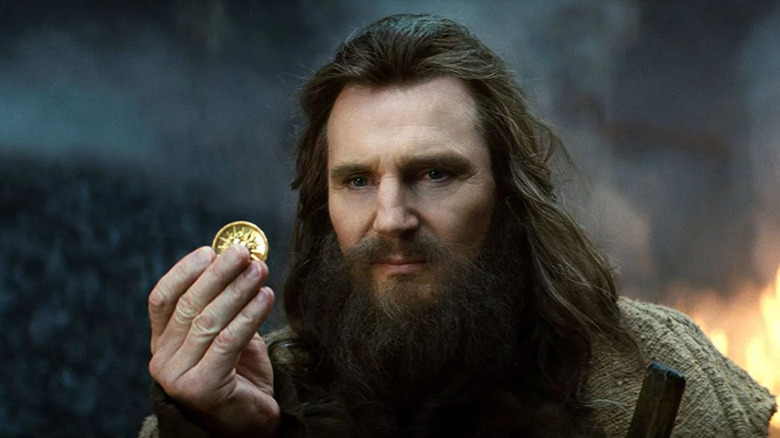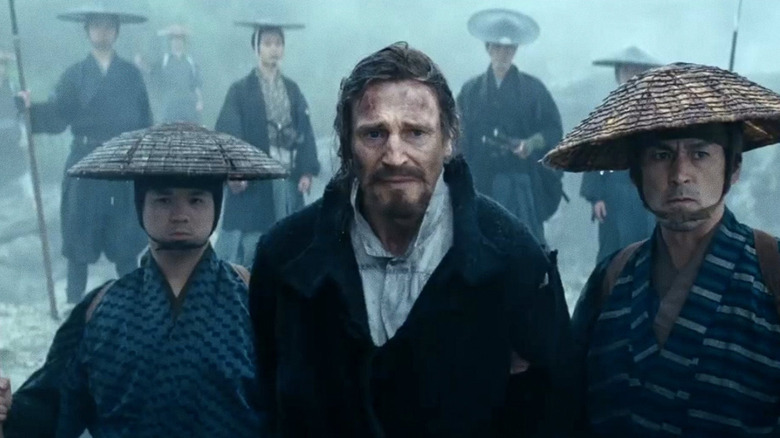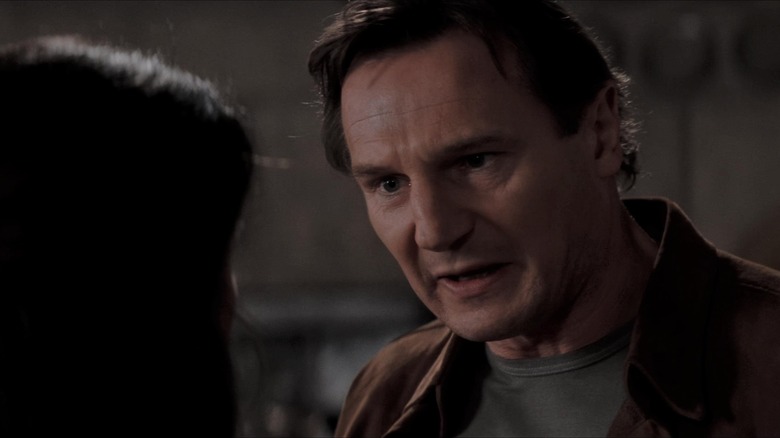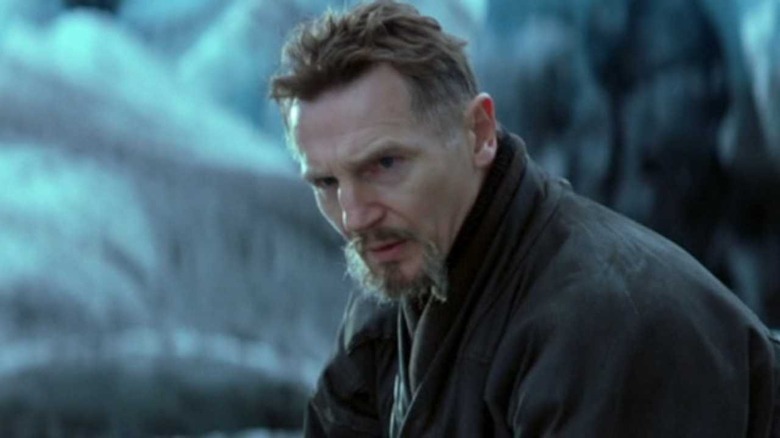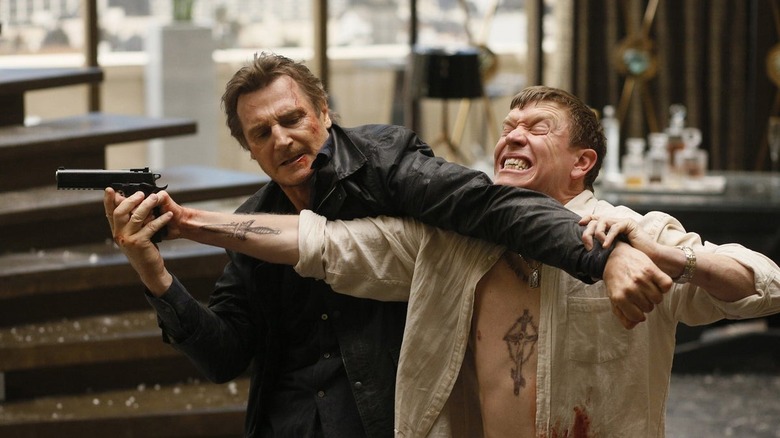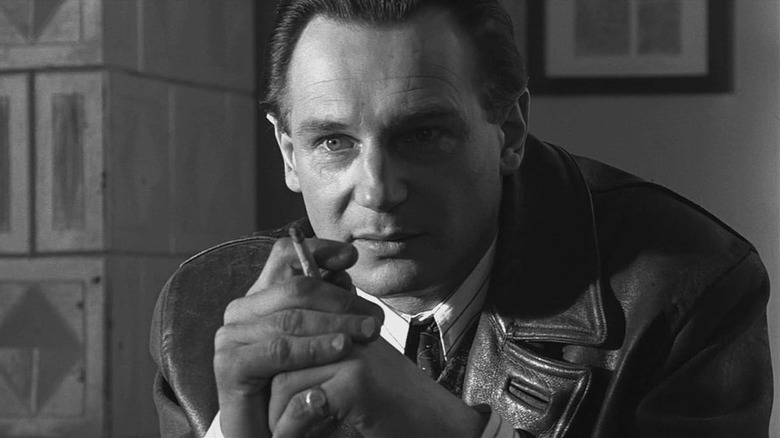The 6 Best And 6 Worst Liam Neeson Movies
Ah, Liam Neeson. The lanky, handsome Northern Irish actor with the distinctive voice has starred in plenty of bona fide hits, and plenty of regrettable misses. His career highs are stratospheric. Who wouldn't want to have a devastating masterpiece like "Schindler's List" in their filmography, be part of a beloved "Batman" reboot that finally did the character proper justice, or get to voice-act in something as wholesomely, joyously fun and imaginative as "The Lego Movie"?
But his career lows are just as lousy as his hits are great. He hasn't been in any of the worst films ever made, but between the "Taken" sequels, "Wrath of the Titans" and "The Phantom Menace," he's turned in his fair share of uninspired performances in films that can only be described as Grade-C, phoned-in schlock.
So what are the best Liam Neeson films ever made? What are the worst? We've assembled them all for you here.
Worst: Men In Black: International
"Men in Black: International" could have been something worth seeing. But it was missing a few things — first and foremost, Tommy Lee Jones and Will Smith, who were delightful in the original. In fact, let us rephrase that. They made the original, which was a hilarious sci-fi outing and one of the most underappreciated blockbuster gems of the late '90s. Problem is, the movie worked because it was zany and self-aware, which is great for a one-off but not an ideal springboard for a cinematic universe. The leads were likable. The aliens were fun. The jokes landed. Let it be. What each of the movie's three sequels lacked is a reason to exist.
Sadly, 2019's "International," in which Neeson plays High T, head of the MIB UK branch, is yet another skippable, uninspired cash grab. The Rotten Tomatoes critics consensus puts it thusly: "Amiable yet forgettable, 'MiB International' grinds its stars' substantial chemistry through the gears of a franchise running low on reasons to continue."
Neeson himself tries his best with what he's given, and Chris Hemsworth and Tessa Thompson are suitable in the lead roles. But their chemistry only works well enough to make you wish you were watching "Thor: Ragnarok" instead.
Best: Darkman
Based on a short story by director Sam Raimi, "Darkman" sees Neeson as Peyton Westlake, a scientist who's disfigured and left for dead in a brutal mob attack. His treatment fails, but it does give Westlake superhuman powers (while also corrupting his mind). Consumed by vengeance, he dons the name Darkman and sets out to exact revenge on Robert Durant (Larry Drake), the mob boss responsible for his injuries. Frances McDormand and Colin Friels support as Julie Hastings and Louis Strack Jr., Westlake's attorney girlfriend and the corrupt real estate developer she ran afoul of, which sets up the attack in the first place.
The movie is peak Sam Raimi, which is to say it's grotesque in a campy way, but it's self-aware, knows its limits, and isn't without loads of over-the-top, stylized fun. According to Rotten Tomatoes, critics loved the movie. The consensus reads: "Gruesome and deliciously broad, Sam Raimi's 'Darkman' bears the haunted soulfulness of Gothic tragedy while packing the stylistic verve of onomatopoeia springing off a comic strip page."
This is a dark, hard-to-watch "superhero" movie that feels ripped straight from the pages of a noirish graphic novel. But it's also a hell of a watch. Neeson in particular is in strange but excellent form as the tortured, ruined Westlake. We only wish he'd pushed himself this far in future films. But we'll take what we can get, and what we got here is something else.
Worst: Star Wars Episode I -- The Phantom Menace
On paper, getting cast in a "Star Wars" movie seems like a dream come true. We all know how these things tend to turn out, though, with middling critical reviews and legions of aggrieved fans demanding answers and explanations. Liam Neeson was among the first people to learn this the hard way, after starring as Jedi Knight Qui-Gon Jinn in 1999's "Star Wars Episode I — The Phantom Menace."
In this prequel, Jinn and his apprentice Obi-Wan Kenobi (Ewan McGregor) introduce a young Anakin Skywalker to the Jedi Order, while also fighting to resolve an interplanetary dispute that may be the doing of the Sith. In the larger context of the prequel trilogy, the only thing you need to know here is that soon-to-be-emperor Palpatine is up to no good and that Anakin was a kid once. Even if you can get over the story's insignificance, there's not much to like. The Rotten Tomatoes critics consensus reads: "Burdened by exposition and populated with stock characters, 'The Phantom Menace' gets the 'Star Wars' prequels off to a bumpy — albeit visually dazzling — start."
Neeson's presence does ground the film a bit — just a bit — but it's far from his best character. Being in such a lousy script and having to interact with Jar Jar Binks certainly doesn't help. The lightsaber duel at the end of the film is pretty epic, though. But you knew that already.
Best: Ordinary Love
In 2019's "Ordinary Love," directed by Lisa Barros D'Sa, Liam Neeson and Lesley Manville star as Tom and Joan Thompson, a married couple who struggle after getting Joan's breast cancer diagnosis. At first glance, that story looks like it would be, at best, a melodramatic paint-by-numbers drama that doesn't challenge its actors or the audience. But "Ordinary Love" will surprise you. Owen McAfferty's script is filled with heart and has plenty to say about relationships, even if it doesn't push the envelope or include anything too unexpected. But that's okay. Not every movie has to, as long as it handles its story well.
Critics loved the film. Neeson has more to do than you might think, playing a man who's constantly being jolted between emotional states by one of his life's most tumultuous moments. One thing the story does well is show the kind of weight a serious medical issue can place on a relationship, revealing fault lines partners might not have known were there. Tom and Joan's relationship survives, and so does she, but they learn quite a bit about themselves and each other along the way. The movie doesn't try to be anything other than exactly what it is, but it's a solid, heartfelt, and recommendable watch.
Worst: A Million Ways to Die in the West
Plenty of comedians try their hand at drama at some point or another (looking at you Bill Murray, Jim Carrey, and Robin Williams), often to critical acclaim. When dramatic actors try out a comedy, though, things tend to get dicey. Liam Neeson learned this bitter lesson when he signed on for Seth MacFarlane's "A Million Ways to Die in the West."
He plays Clinch Leatherwood, a notorious outlaw and the husband of Anna (Charlize Theron), who befriends Albert (MacFarlane), a somewhat wimpy sheep-herder. With Anna's help, Albert learns the courage and skills he needs to take down Clinch. It's a fairly bare-bones premise, but in the right hands it could have generated some quality laughs. Unfortunately, critics felt the film was decidedly not in the right hands. Or at the very least, the hands didn't know what they were doing. The movie was bad, is what we're trying to say.
We will admit that it's at least a little intriguing to see Neeson as a villain for once. But he just doesn't do anything interesting with this character (not like the script was helping). It's just Liam Neeson saying his lines in a costume. Everyone else phones it in too, and we don't just mean the actors. The story is meh. The cinematography and music and set pieces are all first level. Only some of the jokes land. Everyone involved can do better than this.
Best: Widows
Based on the 1983 British TV series of the same name, "Widows" follows four women in Chicago who try to steal $5 million from a local politician in order to pay back a crime boss their late husbands robbed before dying during the getaway. There are a lot of twists and turns in this movie, which you probably guessed simply from the logline. But everything works, thanks to a sharp script and excellent direction from Steve McQueen (known primarily for directing 2013's "12 Years A Slave").
Liam Neeson is only briefly featured, but more than holds his own as Harry Rawlings, the late husband of Veronica (Viola Davis). Those two are joined by Cynthia Erivo, Elizabeth Debicki, Daniel Kaluuya, Colin Farrell, Michelle Rodriguez, Robert Duvall, Jon Bernthal, and others. Everyone in the ensemble cast brings their A-game here. One of the layers that makes it work is that while most heist movies feature criminals who genuinely love their work, the women doing the burgling aren't having much fun, but are instead trying to survive. As a result, we get to avoid the typical snarky, eye-rolling heist movie tropes in which the anti-heroes quip and joke as they effortlessly evade cops and spend the movie crafting improbable schemes. This one is intense because it does the opposite. The women are merely trying to make it to tomorrow, and that's enough — for the film and, it seems, for the critics as well.
Worst: Wrath of the Titans
When CGI first came out, it was a game-changing tool that wowed audiences. But folks got wise to the act pretty quickly, and grew skeptical of films that seemed to use it in place of a good story.
Apparently, nobody told "Clash of the Titans" and "Wrath of the Titans" directors Louis Letterier and Jonathan Liebesman, whose Greek mythology movies were undeniable visual feasts that were sadly undermined by garbage writing, stiff performances (including from Neeson, who played the most boring Zeus you've ever seen), and plots that relied almost entirely on mayhem and violence. "Wrath" was the worst of the two, although not by much. The story is a McDonald's ball pit of Greek gods and fantastical creatures, mashed together clumsily and with no respect for their proper context in ancient mythology.
The unfavorable Rotten Tomatoes critics consensus puts it harshly: "Its 3D effects are an improvement over its predecessor's, but in nearly every other respect, 'Wrath of the Titans' fails to improve upon the stilted acting, wooden dialogue, and chaos-driven plot of the franchise's first installment."
Embarrassingly, Neeson also got a Razzie nomination for worst supporting actor.
Best: Silence
One of the biggest problems that religious movies starring the likes of Kirk Cameron seem to have is that they're often centered on improbably perfect protagonists hounded by snarling atheists, often for no reason other than to sell a preachy and unconvincing political narrative. But flawless leads and flat villains who lack believable motivations makes for some lousy storytelling. Luckily, it's possible to tell a story about faith the right way.
Look no further than "Silence," a 2016 film by Martin Scorsese adapted from the 1966 novel of the same name. Liam Neeson plays Cristóvão Ferreira, a Portuguese Jesuit priest who has allegedly renounced his faith after being tortured by Edo-era Japanese officials, who had criminalized Christianity and preaching the Gospel. In disbelief after receiving news of their mentor's apostasy, two pupils (played fantastically by Andrew Garfield and Adam Driver, who went through rigorous dieting and Jesuit training to prepare for the roles) set off on a perilous quest to find him.
Critics felt the movie succeeded where many faith-based narratives have failed before. Its characters are flawed and have their beliefs tested in powerful, believable, and historically authentic ways. The result is a thought-provoking story that leaves you with deep questions about the nature of righteousness and faith, sacrifice and courage. It's also one of Scorsese's most underappreciated films, and houses one of the finest, most haunting, and most passionate performances of Liam Neeson's career. It's proof that even in his later years, Neeson hasn't lost his power.
Worst: The Haunting
When 1999's "The Haunting" was released, it had two things going for it: a solid ensemble cast including Neeson, Lili Taylor, Catherine Zeta-Jones, and Owen Wilson, and impressive visual effects that brought the haunted house the characters unwisely assembled in to life. But the cast was wasted on a crappy, uneven script, and boy did that CGI age poorly. What's left more than two decades later is pure, unintentional schlock.
The movie is about an insomnia experiment that Dr. David Marrow (Neeson) has decided to run in a fancy mansion in the Berkshires. But this is a ruse: Marrow knows this place is haunted, and plans to study his subjects' responses to fear. Certainly the results would be muddied by their sleeping issues, but he's apparently too evil to have thought of that. He has the gates locked and tells his guests that the house was owned by a 19th century textile mogul named Hugh Crain, who became a recluse following multiple stillbirths and his wife's resulting suicide. Crain also employed child laborers and even kidnapped and killed several, whose spirits now infest the house. In the end, Crain's spirit is defeated when the surviving guests announce they're not afraid of him, and he gets stuck in a bronze door. Don't you hate it when that happens?
The second adaptation of "The Haunting of Hill House," Shirley Jackson's classic supernatural novel, "The Haunting" could have been a recommendable standalone horror story. But critics felt that bad writing kept it from rising to even that moderate standard.
Best: Batman Begins
Nowadays, superhero movies are box office titans usually helmed by people who either like comics or are willing to treat the source material with respect. In the late '90s, that wasn't the case. Directors like Joel Schumacher didn't want to be seen as taking this silly children's schlock seriously, so they turned comics-based movies into infantile jokes. This approach was profitable for a few years because there was no alternative, and nobody knew you could treat comics as worthy literature. But 1997's "Batman and Robin" was simply a bridge too far for audiences. The series was shelved, along with the camp.
Enter Christopher Nolan. The up-and-coming "Memento" director was hot stuff, and Warner Brothers decided to give him a shot at the big time with a 2005 Batman reboot, titled "Batman Begins." In the story, Liam Neeson plays the imposing, arrogant Ra's al Ghul, originally disguised as League of Shadows leader Henri Ducard, who trains Bruce Wayne to fight and sneak around like a ninja. However, his ultimate goal to destroy Gotham for its wicked ways puts him at odds with Batman.
Do we need to explain the rest? You've all seen it. You all love it. So did the critics. Comic fans felt legitimized by the movie, which took itself and the mythology just seriously enough. It turned Nolan into something approaching a household name, and led to a sequel that just might be one of the greatest films ever made.
Worst: Taken 3
In the original "Taken," Brian Mills' daughter is kidnapped by human traffickers while vacationing abroad, and he must put his "very specific" skills as a Green Beret/CIA vet into action to save her. The movie was brainless, but the shootouts worked, Liam was convincing enough as an action hero and of course, we got the quintessential Neeson monologue that's been parodied ad nauseum. (But seriously, folks, we can officially retire any and all "I will find you, and I will kill you" jokes. New things have happened that you can reference.)
The film was successful enough to get a few sequels. The first involved relatives of the traffickers Neeson killed in the original, kidnapping him to get revenge. Fine. That makes enough sense. The second sequel, "Taken 3," is where it gets ludicrous. Not only is Neeson's age forcing the movies to rely more and more on dizzying shaky-cam action that was getting stale back when the "Bourne" movies were still coming out — to distract you from his lazy, winded, old man punches — but critics felt the story itself was laughable. We understand that a guy like Mills will make enemies along the way, but how sharp is that "very specific set of skills" if he can't stop himself and his family members from becoming hostages every time they go on vacation? Security isn't just about punching people. It's about seeing threats from afar and stopping them before you have to whip out a service weapon.
Best: Schindler's List
There are many Holocaust movies, but only one "Schindler's List." This 1993 Steven Spielberg epic, shot mostly in black and white, follows Neeson as real-life German industrialist Oskar Schindler, who tried to balance his own safety and business ambitions with the moral imperative that he can't turn a blind eye to Nazi mass murder. Of course, he can't simply stand up and decry the killings without joining the victims in death. He ends up threading the needle admirably, saving hundreds of lives by bribing Nazis to allow him to staff his munitions factory with condemned Jews who would have otherwise been sent to the gas chambers.
Neeson's Schindler is a fascinating character. He's not universally good, at least not at first. He's a drinker, a gambler, a womanizer, and he spends a good deal of the first act wrestling with whether or not he should act at all. When he does, he's motivated by profit. But by the end of the film he's spent his fortune bribing Nazis, risked his life repeatedly, and defrauded the Reich by maintaining a munitions factory for years without producing a single functioning shell. There's no singular reason he does this, but rather a collection of small moments and choices that push him further and further into righteous danger.
This widely acclaimed, essential film was nominated for 12 Oscars and won seven, including Best Picture, Best Director, and Best Adapted Screenplay. It also landed Neeson his sole Oscar nomination to date, for Best Actor in a Leading Role, an accolade that eludes him to this day.
